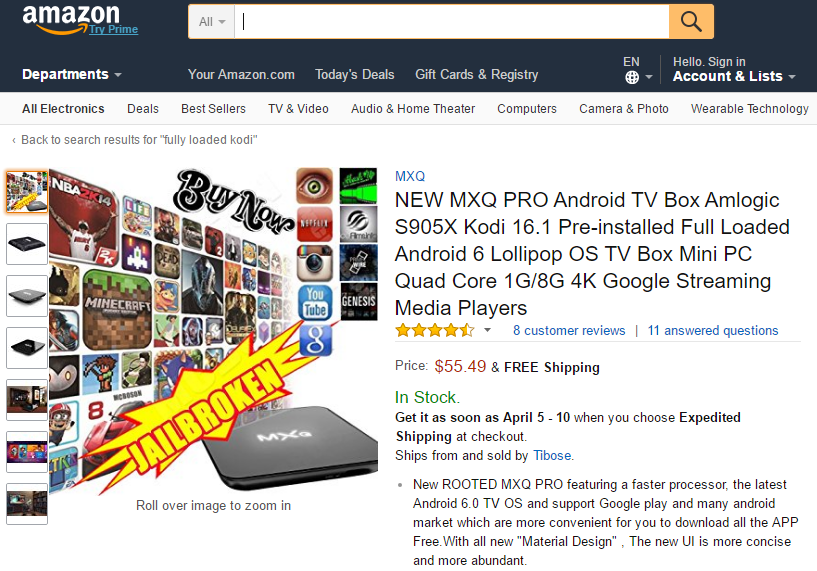Amazon Bans Sales of “Pirate” Media Players, Will Destroy Them
vendredi 31 mars 2017 à 21:30 Streaming piracy is on the rise with popular media player Kodi at the center of attention.
Streaming piracy is on the rise with popular media player Kodi at the center of attention.
While Kodi itself is a neutral platform, millions of people use third-party add-ons to turn it into the ultimate pirate machine.
In some cases, the pirate add-ons are put onto the devices by vendors, who sell these “fully-loaded” boxes through their own stores or marketplaces such as Amazon. While Amazon has never explicitly allowed the sale of copyright-infringing devices, they are not hard to find in its store.
This is a thorn in the side of major copyright holders, who have repeatedly complained about fully-loaded boxes.
Amazon appears to be well aware of the controversy, as it recently published an updated policy clarifying that pirate media players are not permitted on the platform. Merely ‘suggesting’ that devices can be used for infringing purposes is enough to have them delisted.
“Products offered for sale on Amazon should not promote, suggest the facilitation of, or actively enable the infringement of or unauthorized access to digital media or other protected content. Any streaming media player or other device that violates this policy is prohibited from sale on Amazon,” the company writes.
Amazon states that it is up to the vendor to determine whether their products meet these standards. Those who still cross the line are in for an unpleasant and costly surprise. Amazon states that it will destroy the devices without reimbursement.
“If you sell these products, we may immediately suspend or terminate your selling privileges and destroy inventory in our fulfillment centers without reimbursement,” Amazon writes.
In addition, if there’s proof that the vendors were engaging in illegal activity, any pending payments may be withheld or forfeited under the policy.

While the announcement was published without fanfare, it hasn’t gone unnoticed. Anti-piracy company Irdeto, which works with several major copyright holders on pirate streaming box cases, sees the new policy as a breakthrough.
“This first of its kind preventative measure aims to minimize the pirates’ promotional reach. It’s a policy I hope the other e-Commerce sites will emulate,” Mark Mulready, Senior Director Cyber Services and Investigations at Irdeto, notes.
Despite Amazon’s strong language the site still features many devices marketed as fully-loaded streaming media players. Some, including the one below, even use pirate sources such as Icefilms, Primewire and the Genesis Kodi add-on to market their products.

According to Irdeto, the media player software itself is not at fault. In a way, they are a victim of the pirates too, much like copyright holders. The pirate sources and the rogue vendors are the ones that create and maintain the problem.
This is also reflected in the legal cases that have been launched thus far over the misuse of Kodi players. Both in the UK and the Netherlands, test cases against sellers of “fully-loaded” devices are aiming to stop the phenomenon.
In the United States, the problem is also on the radar now. MPAA boss Chris Dodd recently said that finding a solution to the illegal use of Kodi is one of the main piracy questions the industry currently faces, so it’s likely that more enforcement actions will follow.
Source: TF, for the latest info on copyright, file-sharing, torrent sites and ANONYMOUS VPN services.

 In common with many other Internet service providers in the United States, RCN receives its fair share of copyright infringement notices, including sizeable numbers from anti-piracy outfit Rightscorp.
In common with many other Internet service providers in the United States, RCN receives its fair share of copyright infringement notices, including sizeable numbers from anti-piracy outfit Rightscorp.
 After Megaupload was shut down more than five years ago, data from hundreds of the site’s servers were put in storage by several hosting facilities, Cogent included.
After Megaupload was shut down more than five years ago, data from hundreds of the site’s servers were put in storage by several hosting facilities, Cogent included.